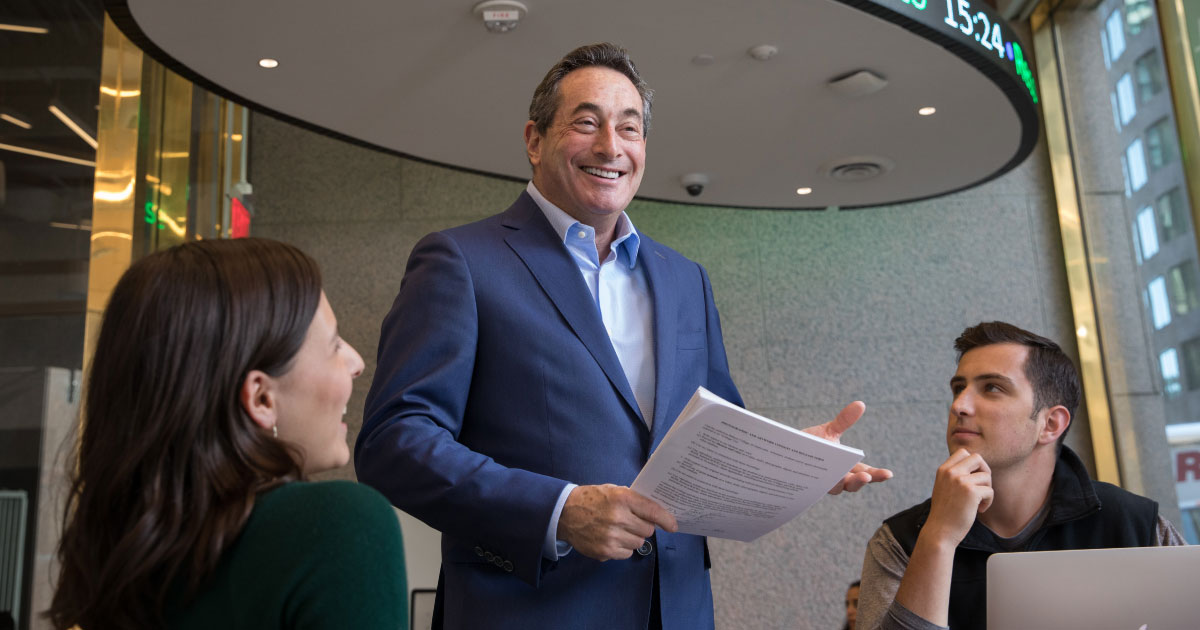Looking for a Stock Tip? Invest in Entrepreneurs

Joel Shulman was not your typical kid. At 8 years old, an age when most boys are preoccupied with sports, toys, and raising a ruckus, Shulman had his own broker. “I was a goofy little kid,” says Shulman, a professor of entrepreneurship at Babson College.
A beloved aunt invested in stocks and piqued his interest, passing along analyst reports to him. Shulman’s first stock was Pan Am. “They ended up going bankrupt,” he says. “I should have sold them.”
Shulman has gone on to experience much success in the markets since those early days. A regular business commentator on CNBC and Fox Business, he is the founder and managing director of investment firm EntrepreneurShares. “It’s a unique company in the money management space,” he says. “We are the only one that invests in publicly traded entrepreneurial businesses.”
That focus on entrepreneurship has proven effective. Shulman started his company as a small hedge fund in 2005, but today, EntrepreneurShares manages $500 million in assets at its Boston office, located near South Station. On February 8, for the second time in a little over a year, he rang the closing bell on the New York Stock Exchange to celebrate the launching of one of his entrepreneurial funds.
Entrepreneurs have a different outlook, says Shulman, one that embraces a long view of growth. And that way of thinking produces results for their companies and the people who invest in them.
Not the Standard CEO
When running its three mutual funds, two exchange-traded funds, and many separately managed accounts, EntrepreneurShares uses a proprietary investment model that takes into account 15 variables it associates with entrepreneurial-minded companies.
What those 15 variables are measuring is essentially management. “What it really comes down to is the governance traits of the entrepreneurs,” Shulman says. “Leadership matters.”
At most big companies, says Shulman, the CEOs often look and act alike. Their average age tends to range from 45 to 52, and they don’t last long in the top spot. As they grow older, they run the risk of being forced out of the job. “You see very few who are 60,” Shulman says. “They have the life of an NFL running back. They are there three to five years.”
With such a limited time in charge, CEOs are often fixated on growth. “Get bigger, and you can justify paying yourself more,” Shulman says.
Leaders of entrepreneurial-minded companies, on the other hand, are different. Their ages vary, with only about a third in the traditional age range of CEOs seen at more established companies. What’s more, they stay much longer in the job, so they are more patient and strategic about growing the company and are averse to taking unnecessary risks. “If it’s your company, you are not going to grow for the sake of growing,” Shulman says. “You are going to grow organically. You are going to make acquisitions because they make sense.”
For entrepreneurs, their company represents their legacy. They’re interested in building good teams, retaining them, and setting the tone for the organization for years to come. “When it’s your company, you monitor people, you keep costs low, and the message carries through,” Shulman says. “People around them know exactly where they stand.”
Another Bottom Line
That stability and long-range thinking makes for sturdy companies, says Shulman, and that, in turn, means solid returns. Many factors determine stock performance, but Shulman’s research reveals that the entrepreneurial mindset is, as he puts it, “the most significant factor in helping explain excess returns over the peer benchmark.”
According to research Shulman just published in The Journal of Index Investing, entrepreneurial-minded companies also have another benefit: They demonstrate strong returns in a type of investing known as Environmental, Social, and Governance (or ESG for short).
Part of a broader movement in which investors look for returns on their investment beyond just the traditional bottom line, ESG focuses on exactly what its name implies. Shulman found that entrepreneurial companies often have a low environmental footprint, effective corporate governance, and a significant social impact on their communities. “The cherry on the ice cream sundae is that these guys provide job growth,” he says. “The job growth is extraordinary.”
Ring That Bell
The success Shulman has experienced with EntrepreneurShares has led him twice to travel to Wall Street and ring the closing bell at the NYSE. The first time was in November 2017 when he launched Entrepreneur 30, a fund composed of 30 large-cap entrepreneurial companies, including recognizable names such as Amazon, Facebook, FedEx, and Netflix. Entrepreneur 30, which trades under the ticker symbol ENTR, has roughly $70 million in assets.
About 250 people attended the launch of the fund. Many of them had Babson connections, including some alumni who were the first students Shulman had taught at the College. “I got choked up looking around,” admits Shulman.
Earlier this year, Shulman went to the NYSE again to launch another entrepreneurial fund, one focused on smaller companies. Called ERShares Non-US Small Cap (with ticker symbol ERSX), the fund has about $50 million in assets. When given the chance to have another closing-bell celebration, Shulman couldn’t turn it down. “It was so much fun the last time,” he says.
Posted in Community






